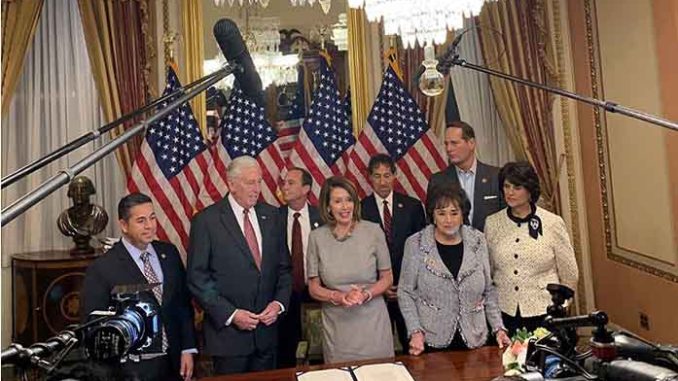
WASHINGTON – The five-week government shutdown that ended Friday shaved as much as $11 billion off the real gross domestic product while it lasted, according to a report released Monday by the Congressional Budget Office.
Much of that lost activity will come back when federal workers are repaid and those numbers, while large, will not create a major impact on the nation’s or the state’s economy, according to the report and to local economists.
Arizona chambers of commerce said they had not heard of any particular hardships on businesses as a result of the shutdown, but other officials said the effect on individuals should not be minimized.
“Thousands of Arizona families and hundreds of thousands more across the country went more than a month without being paid,” said Rep. Tom O’Halleran, D-Sedona, in response to the CBO report. “They are tired of being pawns in this political game.”
The employees who worked without receiving their paychecks on time will receive their pay at a later date, if they have not already received them.
That game began Dec. 22 when President Donald Trump did not sign a budget bill to fund operations for about a quarter of the federal government because it did not include $5.7 billion he had demanded toward a border wall with Mexico. Without funding, those agencies were forced to close, meaning about 800,000 federal workers have gone without pay since then.
More than half of those employees still had to work without pay because they were deemed “essential” workers – Border Patrol agents, Transportation Security Administration officers and the like.
But that still left many national parks untended, services like E-Verify shut down, Internal Revenue Service help lines unstaffed and food stamp recipients wondering if the government would reopen in time to issue benefits for March.
The shutdown ended Friday when Trump signed a bill funding those agencies for another three weeks, during which House and Senate members will negotiate on border security funding. Part of that deal calls for back pay for furloughed federal workers.
Many of the shutdown’s effects were blunted in Arizona, with the Interior Department able to find funding to keep Grand Canyon National Park open on a limited basis and Border Patrol agents continuing to work.
Dennis Hoffman, a professor of economics at Arizona State University’s W.P. Carey School of Business, said that when it comes to the impact the shutdown had on the state, there is “no way to measure this with any accuracy.”
“Especially if it’s just delayed payments to workers, not complete loss of income,” he said in an email Monday.
The CBO estimated that real gross domestic product in the first quarter of 2019 is $8 billion lower than it would have been without a shutdown, and it was $3 billion lower in the fourth quarter of 2018. The report said most of those losses will be recovered now that the government is up and running, but that about $3 billion will never be replaced.
The losses will depress GDP by 0.1 percent in the fourth quarter and by 0.2 percent in this quarter, but the CBO predicted that the ultimate hit will be just 0.02 percent of projected annual GDP.
University of Arizona professor George Hammond said it is likely the growth rate will slow for a period of time, but other than that he does not see any lasting impacts. While it will not have a long-lasting effect, however, Hammond said it is important not to “minimize individuals” who were harmed by the shutdown.
“For particular contractors, it’s a big deal,” said Hammond, director of economic and business research at UA. “But even so, the overall economy is so much bigger than that.”
That was the sentiment from chambers of commerce around the state.
Peoria Chamber of Commerce President Guy Erickson said he had not heard anything from his members concerning the shutdown and Garrick Taylor, a spokesman for the Arizona Chamber of Commerce, said there has “not been a ton of feedback” from businesses about the shutdown. He said most concerns he heard were about E-Verify being down.
Michael Guymon, vice president of the Tucson Metro Chamber of Commerce, said no businesses had reached out with problems regarding the shutdown. But because Tucson has a large number of federal workers, he said the shutdown could have had a “trickle-down effect” on local restaurants and businesses.
Guymon said the defense contracting company Raytheon is Tucson’s biggest employer, but their contracts with the federal government were not affected by the partial shutdown.
The federal government awarded $16 billion in contracts to Arizona businesses in fiscal 2018, three-quarters of it from the Defense Department, according to USASpending.gov.
Although segments of the government reopened Friday, Trump has threatened to shut them down again in three weeks if a border deal is not reached.
